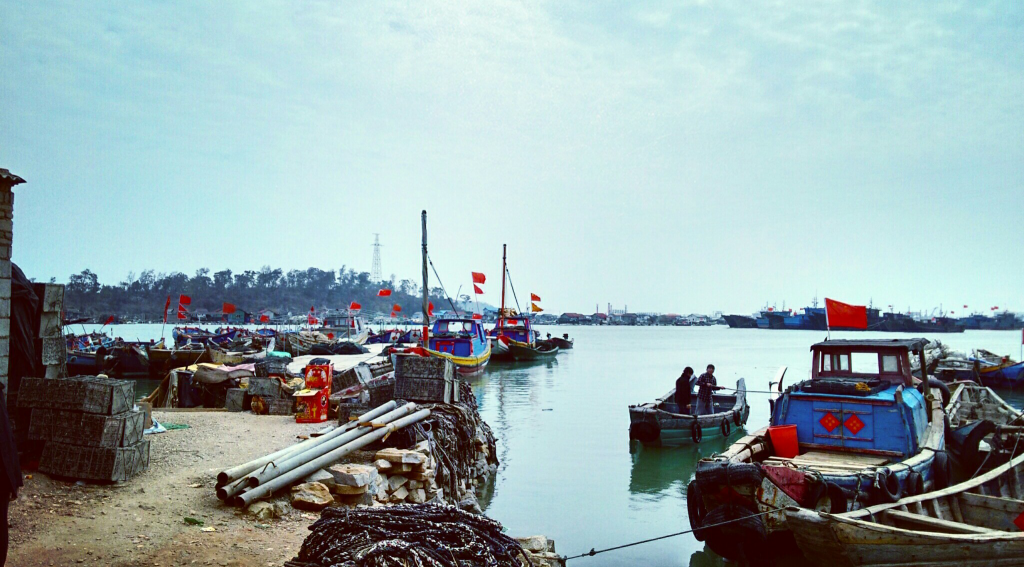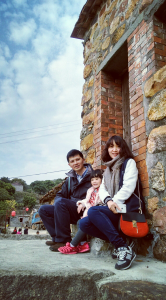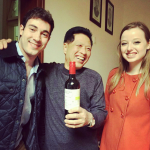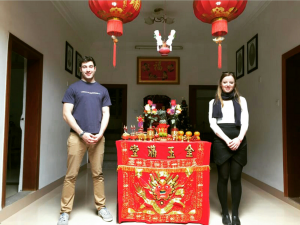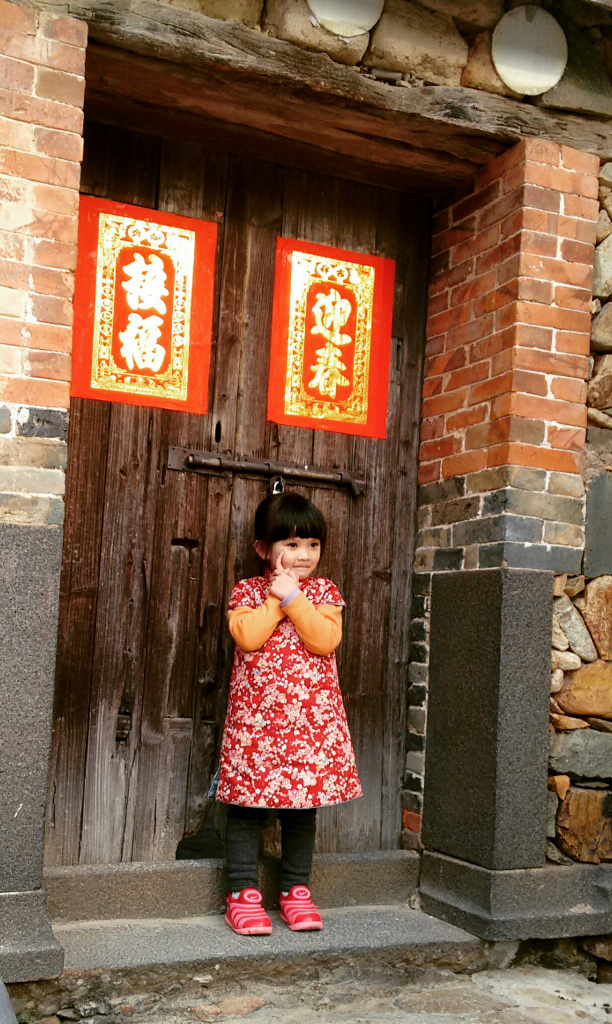今年二月我和我男友Nick在渔村过春节了。那边就是我朋友丈夫的家乡。那个渔村坐落在 福建省泉州市的附近,离厦门市开车要两个小时。这个渔村里的人都姓肖,在村里一喊出 “小肖”来,周边所有的人会回头看你。
在中国不能两手空空的去别人家,提前准备礼物很重要的。在厦门一个德国男人劝我们买一条当地特色的鱼送给他们,因为“鱼”与“余”谐音,所以鱼象征着富贵,但是到了与市场 我们俩决定自己在袋子里带还活着的鱼是受不了的,还是送一蓝水果、一瓶马莎红酒、一朵兰花吧。
肖厝村的渔民都靠天气吃饭,所以他们很看重祭祖、拜佛等。我们开进小村时,家人和邻居都去“拜拜”了(闽南话)。在这种安安全的社区,家家户户都没装门,路上能看到里面的“拜家堂”, 他们摆了美酒、佳肴、时令果品,供列祖列宗享用,还点燃香纸蜡烛。拜天地带来好运气,保证渔民在海上的安全。
在渔村天天都吃新鲜的海鲜,年夜饭满桌摆上了大螃蟹,大虾,牡蛎,干慢鱼汤,鱼头,海带,海参,海鲜面线。厦门这边也有很多奇怪的水果,比如杨桃、鸡蛋果(本地人用吸管喝这个!)、莲雾。大让我吃惊的是这边的人最爱喝的是红酒。红酒这个外来就在这么小的村里红了!好像是因为白酒味道很强,南方人受不了,而啤酒配海鲜对身体不好。
据风俗初一初二不能走离家远的路,所以我们在附近玩了两天。我们坐大爷朋友的海船出了海,海上波涛汹涌,让我朋友小女儿很开心,能看到本地人海网里养的牡蛎海带等。白白的海鸥在风飘飘,寻找小鱼。对面的岛屿,那边的人一直都放鞭炮,吵得不得了!那天我们还去了明朝的老房子。房子都是用黄石头一块一块扣在一起。有的用糯米代替那个时候没有的水泥
他们肖家庭的房子有屋顶,除夕那天的晚上我们就站那里看着小港上面的烟花,鲜艳的大火照亮蓝黑的天空。中国大城市,比如北京上海不能放鞭炮的,因此在乡下过春节味道要浓多了。周边邻居都互相认识,随便去隔壁家祝福新春快乐,享用年夜饭,互相敬一杯
在他们肖家我认识了一个小妹妹同我一样叫“小白”,阿姑告诉我们她可怜的故事,她父母早就走了,现在只有她爷爷还在呢,父母把她给保姆家养,可是保姆家不管,阿姑第一次见到她大为吃惊,妹妹还不能自己走路。妹妹现在在他们肖家里,可是大家都很忙所以大时候小妹妹就自己玩,自己也去睡觉,就抱抱她的小兔子和娃娃。这个小妹妹很活泼,也很独立,年龄才三岁。话也都是她自己学会的。这个天天高高兴兴的小女孩让我很感动,也让我想起在乡下女孩地位低的问题,很都女孩是不要的,父母也不管,中国乡村有很远的路要走 才能有城市一样发达
在他们渔村里,一个房子有几层楼代表那户家庭有几个儿子。他们肖家有两个儿子,所以房子三楼高。大姐哥哥妹妹弟弟四个孩子都带自己的家庭回家乡看大爷和奶奶。大家团聚了气氛很热闹!中国春节像是英国圣诞节和元旦的习惯混在一起。我永远会很珍惜这个在中国家庭里过春节的回忆。
ENGLISH TRANSLATION:
This February I spent Chinese New Year in a fishing village with by boyfriend Nick. The village is the birthplace of my friend’s husband, and is located near Quanzhou in Fujian Province. It’s only a two hour drive from Xiamen. Everyone in the village has the same surname, so if you call out “Xiao” there then everyone around you will turn around to look.
In China you cannot visit someone else’s home empty handed. Preparing gifts in advance is crucial. In Xiamen a German resident urged us to buy a local fish, because fish sounds like surplus in Chinese, and so fish symbolises wealth and fortune. However we decided after we got to the fish market that carrying a live fish in a bag was unbearable, so instead we settled on a basket of fresh fruit, a bottle of red wine (from M&S in Suzhou) and an orchid.
In Xiancuo village the fishing people rely on good weather to survive, so sacrificing to their ancestors and Buddha is very important. When we drove up, the rest of the family and their neighbours had gone to “bai bai” (Fujian dialect for going to pray in front on the offerings). In this peaceful community, no house had a front door, and so on our way we could see their red shrines inside decorated with good wine, delicious plates of food, seasonal fruit, all lined up in front of the ancestors. Candles and incense were burning around them. Sacrificing offerings to the heavens and earth can also bring good luck, keeping the fishermen safe at sea.
In the fishing village they eat fresh seafood every day. On New Year Eve the dinner table groaned under the weight of crabs, prawns, mussels, eel, fish heads, seaweed, sea cucumbers and seafood rice noodles. In Xiamen they also have many strange fruits such as star fruit, wax pears, and passion fruit (which people here suck out with a straw!).
What surprised me on New Year was that the people here most favoured alcohol is red wine. How could this foreign imported alcohol be popular here! It seems to be white spirits which are popular in the North are too strong for southern palettes, and beer is not good for you when accompanying seafood.
On the first and second day of the New Year you cannot travel too far from one’s home according to custom, so we explored the local area for two days. We took the boat of the grandfather’s friend out to sea, which was very choppy, much to the amusement of my friend’s little daughter. You could see the mussels and seaweed they grew out there in nets. White seagulls floated on air currents looking for small fish. On the opposite island, people constantly let of firecrackers, which was deafening!
We also went to see some old Ming dynasty houses that day, which were pieced together out of yellow stone. Some were held together with ground rice paste, because at that time cement was non-existent in China.
The Xiao family’s home had a roof which we stood on New Year’s Eve to watch the fireworks over the small harbour. The colourful lights lit up the dark navy sky. In large cities in China such as Beijing or Shanghai, they are not permitted to set off firecrackers, so it is much more authentic to spend New Year in the countryside. Everyone knows one another, and goes round each other’s house to share the New Year meal and cheers one another.
There was a little girl in the Xiao family called “Little White” (the same nickname as me). The younger auntie told us her sad story. Her parents had left long ago, and now only her grandfather remained. She had been given to a nanny’s family to be looked after, but they had not looked after her properly. The first time this auntie had seen her, the little girl had not been taught how to walk. Now Little White lived in the Xiao family household, but as everyone was very busy she often played alone and even slept by herself, with only her little toy rabbit and doll to cuddle. The little girl was very lively, and independent, even at the age of three. She had learnt to speak by herself. This happy little girl really moved me, and made me think of the low social status of women in the countryside. Lots of new-born girls are unwanted, and parents don’t look after them. The gap between the countryside and the cities still remains large.
In this fishing village, how many floors a house has represents how many sons that household has. In this household there were two sons, so the house was three stories high. The two sisters and brothers had all come back with their own families to see their parents. With everyone reunited back together there was a great lively atmosphere. Chinese New Year reminded me of our Christmas and New Year traditions mixed together.
I will definitely remember spending Chinese New Year with a family forever.

